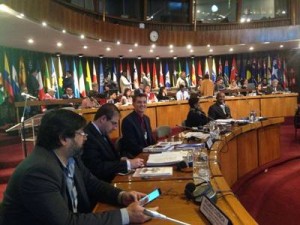by Daniel Pier
For some teachers, the phrase “21st-century skills” conjures images of students learning to use the latest technology. However, a broad consensus recognizes that technology literacy is just one of an array of skills not emphasized in traditional educational settings that are becoming increasingly important for students’ eventual success in work and life.

ITEN Coordinator, Mr. Daniel Pier at the
“Teaching and Learning in the Education 2030 Agenda: Policy Dialogue” meeting
in Santiago de Chile, Chile
ITEN was privileged to attend “Teaching and Learning in the E2030 Agenda: Policy Dialogue,” a three-day meeting in Santiago de Chile, Chile, organized by UNESCO, where ministry of education leaders and other experts from around Latin America and the Caribbean explored the theme of teaching, learning, and measuring 21st-Century skills.
As noted at the conference, 21st-century skills include, among others, creativity, critical thinking, information literacy, local and global citizenship, and collaboration. Presenters acknowledged that the need to add these skills to traditional domains of knowledge such as reading, writing, and arithmetic places greater demands on teachers, and that recruiting, preparing and assessing teachers must reflect this new reality.
For the recruitment and retention of teachers, experts shared several recently designed career ladders, including that of Chile, which includes four required and two optional assessments that demonstrate advancement to higher levels of expertise with associated increases in salary. Regarding teacher preparation, experts asserted that both pre-service and in-service teacher education must be more closely tied to the school experience and must facilitate learning among peers. Assessments highlighted included Bogotá, Colombia’s, SER exams, which measure students’ citizenship, arts, and physical skills, as well as Uruguay’s student assessment system, which is performed entirely online, offering teachers immediate feedback on how their students are performing.
While conference participants clearly recognized that the region needs to make great strides to incorporate the effective teaching of 21st-century skills into its education systems, the experiences shared demonstrate that much can be learned from policies, programs, and practices already in place.
How are you, your school, or your district incorporating 21st-century skills? Please let us know in the ITEN virtual community.
 Dan Pier is a teacher professional development specialist and curriculum developer with twenty years of experience in education, communications, and project management. He coordinates the Inter-American Teacher Education Network (ITEN).
Dan Pier is a teacher professional development specialist and curriculum developer with twenty years of experience in education, communications, and project management. He coordinates the Inter-American Teacher Education Network (ITEN).
